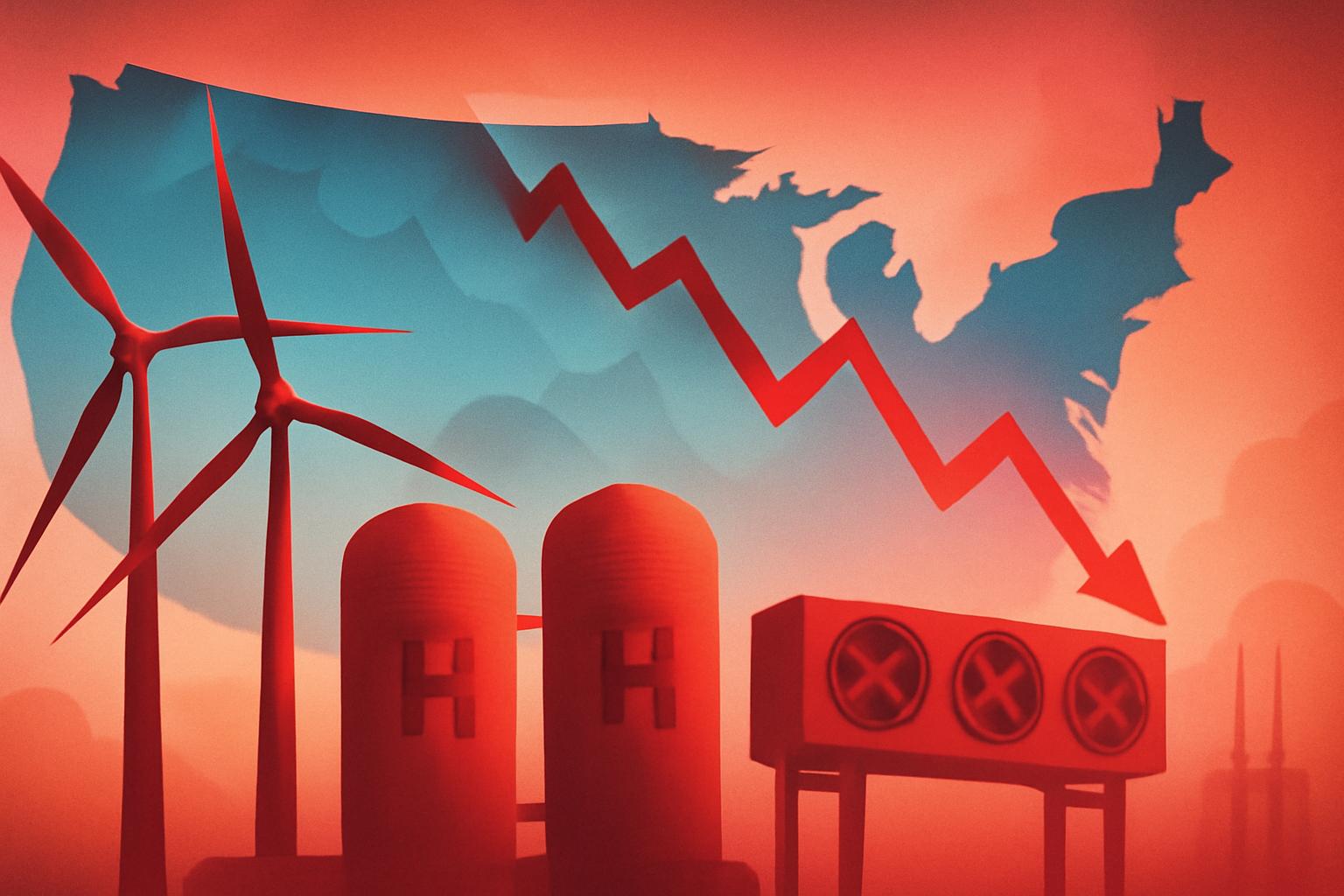The Department of Energy’s sweeping cancellation of clean energy awards introduces significant uncertainty into the U.S. clean technology sector, particularly in states with strong Democratic leadership. This move may hinder progress on hydrogen infrastructure and carbon capture technologies, which are critical for decarbonization efforts. !-- wp:paragraph -->
- Opportunities: Potential reallocation of funds towards alternative energy projects or fossil fuel development; possibility for legal challenges to restore funding.
- Risks: Disruption in clean energy innovation pipelines; loss of investor confidence in government-backed projects; negative impact on climate commitments and state-level initiatives.
FinOracleAI — Market View
The Department of Energy’s sweeping cancellation of clean energy awards introduces significant uncertainty into the U.S. clean technology sector, particularly in states with strong Democratic leadership. This move may hinder progress on hydrogen infrastructure and carbon capture technologies, which are critical for decarbonization efforts. !-- wp:paragraph -->- Opportunities: Potential reallocation of funds towards alternative energy projects or fossil fuel development; possibility for legal challenges to restore funding.
- Risks: Disruption in clean energy innovation pipelines; loss of investor confidence in government-backed projects; negative impact on climate commitments and state-level initiatives.
Legal Responses and Appeals
Award recipients have a 30-day window to appeal the cancellations. Several have already initiated appeals, underscoring the contentious nature of these decisions. Legal challenges against similar contract cancellations at the Environmental Protection Agency have yielded mixed results, with courts divided on the legitimacy and oversight of such government actions. !-- wp:paragraph -->FinOracleAI — Market View
The Department of Energy’s sweeping cancellation of clean energy awards introduces significant uncertainty into the U.S. clean technology sector, particularly in states with strong Democratic leadership. This move may hinder progress on hydrogen infrastructure and carbon capture technologies, which are critical for decarbonization efforts. !-- wp:paragraph -->- Opportunities: Potential reallocation of funds towards alternative energy projects or fossil fuel development; possibility for legal challenges to restore funding.
- Risks: Disruption in clean energy innovation pipelines; loss of investor confidence in government-backed projects; negative impact on climate commitments and state-level initiatives.
Legal Responses and Appeals
Award recipients have a 30-day window to appeal the cancellations. Several have already initiated appeals, underscoring the contentious nature of these decisions. Legal challenges against similar contract cancellations at the Environmental Protection Agency have yielded mixed results, with courts divided on the legitimacy and oversight of such government actions. !-- wp:paragraph -->FinOracleAI — Market View
The Department of Energy’s sweeping cancellation of clean energy awards introduces significant uncertainty into the U.S. clean technology sector, particularly in states with strong Democratic leadership. This move may hinder progress on hydrogen infrastructure and carbon capture technologies, which are critical for decarbonization efforts. !-- wp:paragraph -->- Opportunities: Potential reallocation of funds towards alternative energy projects or fossil fuel development; possibility for legal challenges to restore funding.
- Risks: Disruption in clean energy innovation pipelines; loss of investor confidence in government-backed projects; negative impact on climate commitments and state-level initiatives.
“The Left’s climate agenda is being cancelled,” stated Russell Vought, director of the Office of Management and Budget, highlighting the political overtones of the cancellations.
Political Implications and Partisan Reactions
The cancellations have drawn sharp partisan lines. Russell Vought, OMB director, publicly confirmed that all 16 states with canceled projects voted for Kamala Harris, framing the cuts as a deliberate rollback of the previous administration’s climate agenda. Notably, several red states with canceled projects were omitted from his commentary. !-- wp:paragraph --> These actions are part of a broader trend under the current administration to curtail funding for clean energy and climate initiatives. Earlier in May, the DOE canceled $3.7 billion in awards spanning clean energy, manufacturing, and fossil fuel sectors. The agency has also restricted internal use of terms such as “climate change” and “emissions,” signaling a shift in policy priorities. !-- wp:paragraph -->Legal Responses and Appeals
Award recipients have a 30-day window to appeal the cancellations. Several have already initiated appeals, underscoring the contentious nature of these decisions. Legal challenges against similar contract cancellations at the Environmental Protection Agency have yielded mixed results, with courts divided on the legitimacy and oversight of such government actions. !-- wp:paragraph -->FinOracleAI — Market View
The Department of Energy’s sweeping cancellation of clean energy awards introduces significant uncertainty into the U.S. clean technology sector, particularly in states with strong Democratic leadership. This move may hinder progress on hydrogen infrastructure and carbon capture technologies, which are critical for decarbonization efforts. !-- wp:paragraph -->- Opportunities: Potential reallocation of funds towards alternative energy projects or fossil fuel development; possibility for legal challenges to restore funding.
- Risks: Disruption in clean energy innovation pipelines; loss of investor confidence in government-backed projects; negative impact on climate commitments and state-level initiatives.
“The Left’s climate agenda is being cancelled,” stated Russell Vought, director of the Office of Management and Budget, highlighting the political overtones of the cancellations.
Political Implications and Partisan Reactions
The cancellations have drawn sharp partisan lines. Russell Vought, OMB director, publicly confirmed that all 16 states with canceled projects voted for Kamala Harris, framing the cuts as a deliberate rollback of the previous administration’s climate agenda. Notably, several red states with canceled projects were omitted from his commentary. !-- wp:paragraph --> These actions are part of a broader trend under the current administration to curtail funding for clean energy and climate initiatives. Earlier in May, the DOE canceled $3.7 billion in awards spanning clean energy, manufacturing, and fossil fuel sectors. The agency has also restricted internal use of terms such as “climate change” and “emissions,” signaling a shift in policy priorities. !-- wp:paragraph -->Legal Responses and Appeals
Award recipients have a 30-day window to appeal the cancellations. Several have already initiated appeals, underscoring the contentious nature of these decisions. Legal challenges against similar contract cancellations at the Environmental Protection Agency have yielded mixed results, with courts divided on the legitimacy and oversight of such government actions. !-- wp:paragraph -->FinOracleAI — Market View
The Department of Energy’s sweeping cancellation of clean energy awards introduces significant uncertainty into the U.S. clean technology sector, particularly in states with strong Democratic leadership. This move may hinder progress on hydrogen infrastructure and carbon capture technologies, which are critical for decarbonization efforts. !-- wp:paragraph -->- Opportunities: Potential reallocation of funds towards alternative energy projects or fossil fuel development; possibility for legal challenges to restore funding.
- Risks: Disruption in clean energy innovation pipelines; loss of investor confidence in government-backed projects; negative impact on climate commitments and state-level initiatives.
Key Projects and States Impacted
Significant cancellations include major hydrogen hub projects, such as California’s Alliance for Renewable Clean Hydrogen Energy Systems, which faced a $1.2 billion cut. Similar hubs in Texas and Louisiana were also eliminated. Furthermore, at least 10 direct air capture (DAC) projects, totaling $47.3 million, were defunded, although some DAC projects in Alaska, Kentucky, Louisiana, and North Dakota remain funded. !-- wp:paragraph --> States affected by these cancellations include Colorado, Connecticut, Delaware, Florida, Hawaii, Illinois, Iowa, Maryland, Massachusetts, Minnesota, New Hampshire, New Jersey, New Mexico, New York, Oregon, Tennessee, Vermont, and Washington—all of which largely supported the Democratic ticket in the last election. !-- wp:paragraph -->“The Left’s climate agenda is being cancelled,” stated Russell Vought, director of the Office of Management and Budget, highlighting the political overtones of the cancellations.
Political Implications and Partisan Reactions
The cancellations have drawn sharp partisan lines. Russell Vought, OMB director, publicly confirmed that all 16 states with canceled projects voted for Kamala Harris, framing the cuts as a deliberate rollback of the previous administration’s climate agenda. Notably, several red states with canceled projects were omitted from his commentary. !-- wp:paragraph --> These actions are part of a broader trend under the current administration to curtail funding for clean energy and climate initiatives. Earlier in May, the DOE canceled $3.7 billion in awards spanning clean energy, manufacturing, and fossil fuel sectors. The agency has also restricted internal use of terms such as “climate change” and “emissions,” signaling a shift in policy priorities. !-- wp:paragraph -->Legal Responses and Appeals
Award recipients have a 30-day window to appeal the cancellations. Several have already initiated appeals, underscoring the contentious nature of these decisions. Legal challenges against similar contract cancellations at the Environmental Protection Agency have yielded mixed results, with courts divided on the legitimacy and oversight of such government actions. !-- wp:paragraph -->FinOracleAI — Market View
The Department of Energy’s sweeping cancellation of clean energy awards introduces significant uncertainty into the U.S. clean technology sector, particularly in states with strong Democratic leadership. This move may hinder progress on hydrogen infrastructure and carbon capture technologies, which are critical for decarbonization efforts. !-- wp:paragraph -->- Opportunities: Potential reallocation of funds towards alternative energy projects or fossil fuel development; possibility for legal challenges to restore funding.
- Risks: Disruption in clean energy innovation pipelines; loss of investor confidence in government-backed projects; negative impact on climate commitments and state-level initiatives.
DOE Terminates $7.56 Billion in Clean Energy Awards
On Wednesday evening, the U.S. Department of Energy (DOE) announced the cancellation of 321 awards amounting to $7.56 billion, predominantly supporting clean energy initiatives. The agency has yet to publicly disclose the full list of affected projects, but reports from E&E News and Heatmap indicate that the majority of funding cuts target states that supported Vice President Kamala Harris in the previous presidential election. !-- wp:paragraph -->Key Projects and States Impacted
Significant cancellations include major hydrogen hub projects, such as California’s Alliance for Renewable Clean Hydrogen Energy Systems, which faced a $1.2 billion cut. Similar hubs in Texas and Louisiana were also eliminated. Furthermore, at least 10 direct air capture (DAC) projects, totaling $47.3 million, were defunded, although some DAC projects in Alaska, Kentucky, Louisiana, and North Dakota remain funded. !-- wp:paragraph --> States affected by these cancellations include Colorado, Connecticut, Delaware, Florida, Hawaii, Illinois, Iowa, Maryland, Massachusetts, Minnesota, New Hampshire, New Jersey, New Mexico, New York, Oregon, Tennessee, Vermont, and Washington—all of which largely supported the Democratic ticket in the last election. !-- wp:paragraph -->“The Left’s climate agenda is being cancelled,” stated Russell Vought, director of the Office of Management and Budget, highlighting the political overtones of the cancellations.
Political Implications and Partisan Reactions
The cancellations have drawn sharp partisan lines. Russell Vought, OMB director, publicly confirmed that all 16 states with canceled projects voted for Kamala Harris, framing the cuts as a deliberate rollback of the previous administration’s climate agenda. Notably, several red states with canceled projects were omitted from his commentary. !-- wp:paragraph --> These actions are part of a broader trend under the current administration to curtail funding for clean energy and climate initiatives. Earlier in May, the DOE canceled $3.7 billion in awards spanning clean energy, manufacturing, and fossil fuel sectors. The agency has also restricted internal use of terms such as “climate change” and “emissions,” signaling a shift in policy priorities. !-- wp:paragraph -->Legal Responses and Appeals
Award recipients have a 30-day window to appeal the cancellations. Several have already initiated appeals, underscoring the contentious nature of these decisions. Legal challenges against similar contract cancellations at the Environmental Protection Agency have yielded mixed results, with courts divided on the legitimacy and oversight of such government actions. !-- wp:paragraph -->FinOracleAI — Market View
The Department of Energy’s sweeping cancellation of clean energy awards introduces significant uncertainty into the U.S. clean technology sector, particularly in states with strong Democratic leadership. This move may hinder progress on hydrogen infrastructure and carbon capture technologies, which are critical for decarbonization efforts. !-- wp:paragraph -->- Opportunities: Potential reallocation of funds towards alternative energy projects or fossil fuel development; possibility for legal challenges to restore funding.
- Risks: Disruption in clean energy innovation pipelines; loss of investor confidence in government-backed projects; negative impact on climate commitments and state-level initiatives.













